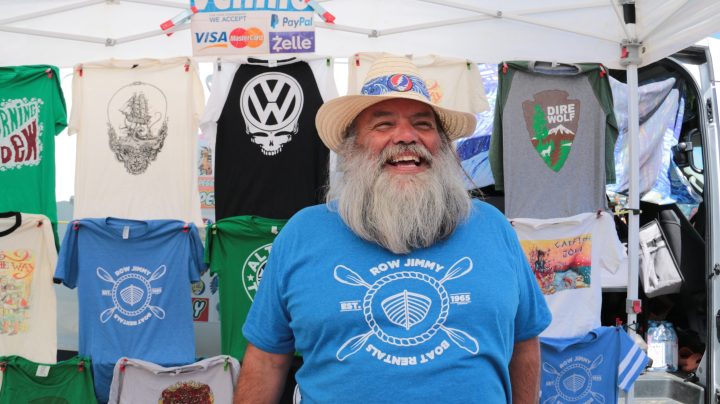
A mini economy follows Dead and Company on tour. What happens now that the show’s over?
A mini economy follows Dead and Company on tour. What happens now that the show’s over?

This is the last summer that the Grateful Dead’s offshoot band, Dead & Company, is on the road. In the hours before their final show in San Francisco, there’s a big crowd at Shakedown Street, the flea market-slash-tailgating party that takes place in the parking lot of each concert.
All kinds of formal and informal sales take place here. Somebody tries to trade a joint for a hot dog. Several people wander the crowd offering balloons filled with nitrous oxide.
Vendors in pop-up tents line the parking lot, offering cool beverages, grilled cheese sandwiches and bacon-wrapped hot dogs, synthetic flower crowns and thigh-high tie-dye socks.
There’s a whole mini economy around Deadheads and the vendors who cater to them.
Outside one pop-up tent, Brian Platzke lounges in a lawn chair. He’s been a Shakedown Street vendor for 38 years and now sells Deadhead T-shirts with his original designs.
This is his full-time job, but he doesn’t quite see it as work.
“It’s the opposite of working,” he said. “Here’s the difference: You guys go on vacation, leave your home. I go on vacation, go to work.”
Platzke dropped out of high school when he was 15 years old to follow the band on tour. After a few years of vending, he says he started making a solid income.
“This is just like a microcosm of a little society where money is generated, people have similar beliefs of the music, whatever the case is, but they conglomerate to sell their wares, share their times and move on,” he said.
That rings true for another vendor named Erin Cadigan. She remembers going to her first show back in the ‘80s. Back then, she had a shaved head and wore combat boots.
“I walked on to that first parking lot and I was like, ‘Oh my god, there’s an entire society of adults that seem to be functioning in space in exactly the way that I want to,’” she said. “And this is what I’m doing with my life.”
Cadigan started selling art and traveling with the band. She even met her husband at Shakedown Street.
She now offers tarot card readings and interpreted a card for one would-be concertgoer who didn’t have a ticket to the sold-out show.
“This is creative manifestation,” she said. “Whatever is manifesting in your life that you want to do, the time is now. Just go for it.”
The customer asked if this means she’ll get into the show tonight.
“Absolutely!” Cadigan replied. “Why are you standing here? Go get a ticket!”
Grateful Dead Productions has fostered this fan-driven economy. In exchange for royalties, the company provides vendors with the right to use the band’s iconography like the Steal Your Face skull and 13-point lightning bolt.
Some vendors deal in small stuff to pay for food and gas. But others, like Platzke, make this their entire career.
“The Grateful Dead’s the ultimate American freedom band,” he said. “It never goes away. People want the freedom. They want to go celebrate that concept.”
Even though Dead and Company says this is the final tour, Platzke is confident that demand for the band’s merchandise and what it represents is here to stay.
There’s a lot happening in the world. Through it all, Marketplace is here for you.
You rely on Marketplace to break down the world’s events and tell you how it affects you in a fact-based, approachable way. We rely on your financial support to keep making that possible.
Your donation today powers the independent journalism that you rely on. For just $5/month, you can help sustain Marketplace so we can keep reporting on the things that matter to you.











